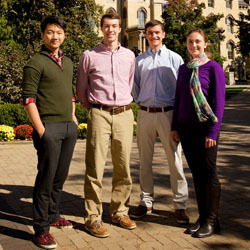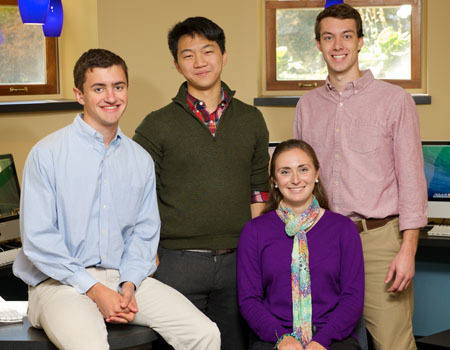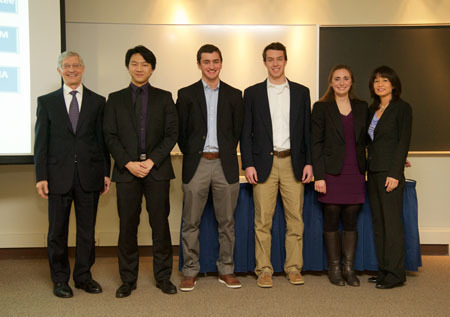

(L-R) Jeff Hansen, Jonathan Jou, Elena Brindley, & Mark Brahier
Innovation and entrepreneurship are terms often associated with the business world, but four Notre Dame students have dedicated themselves to changing that perception on campus. They believe that innovation and entrepreneurship are a vital part of any discipline and the academic experience.
The four biological sciences majors, junior Mark Brahier and seniors Elena Brindley, Jeff Hansen, and Jonathan Jou, are members of the University Innovation Fellows (UIF) program. UIF is sponsored by the National Center for Engineering Pathways to Innovation (Epicenter), a National Science Foundation funded program directed by Stanford University and Venture Well. The program aims to empower student leaders to increase campus engagement with entrepreneurship, innovation, creativity, design thinking, and venture creation. There are 168 Fellows that represent 85 institutions across the country. These students are the first from Notre Dame to be selected for the program.
“As soon as I read about the program, it sounded like a very unique opportunity to learn from students across the country about the importance of innovation on college campuses,” said Brindley. “As a science major, I had always been interested in innovation and entrepreneurship, but had very little experience with it. This program seemed like the perfect chance to gain experience, while also benefiting our own campus here at Notre Dame.”
Following acceptance into the program, the Fellows completed six weeks of online training, which included connecting with their new network of Fellows, examining Notre Dame’s entrepreneurial ecosystems, and creating action plans to implement their ideas.
“As a senior, there's a strong drive to leave the campus better than when I arrived, and after studying at Notre Dame for four years, I’ve realized that the academic tradition here can only be complimented by a robust innovation tradition as well,” Jou said.
During the fall semester, the Fellows met with University leadership, faculty, and students across campus to share their ideas and discuss the entrepreneurial climate on campus. “There was a campus-wide consensus that everyone could benefit from more collaboration and coordination of resources,” Brahier explained. “Through this process, we learned that the task of uniting various organizations can be very challenging.”
To address this issue, the Fellows have proposed the creation of the Council for Academic Leadership and Innovation (CALI). The mission of CALI is to be a collaboration among students and faculty to break down barriers to interdisciplinary education, communicate opportunities, and promote a culture of innovation.
Another initiative the Fellows are working on is Mobile miNDspace, a moveable whiteboard that would travel throughout campus to encourage responses to innovative questions. Each month, a new real-world problem would be posted on the board and students could share their creative solutions on the board.

The Innovation Fellows with Provost Burish and Prof. Michelle Whaley
Mobile miNDspace was piloted in the Hesburgh Library during finals week in December and was well received by students. The board was tested in two different locations in the library with the Fellows observing from a distance as students answered questions such as, “What is your most effective study break?” They observed that students were eager to respond, especially when the board was in very visible, high-traffic area. In recognition for their efforts and accomplishments thus far, the Fellows were recognized by the Department of Biological Sciences and Provost Tom Burish at a pinning ceremony at the end of the semester.
To kick off the spring semester, the Fellows will host an Innovation Roundtable with University administrators, faculty and 35 student organizations across campus. The goal of the roundtable is to promote interdisciplinary discussions and begin the formation of CALI. The Fellows are also planning to find other locations on campus to test Mobile miNDspace.
“Entrepreneurship, innovation, design thinking, or a similar term, should be a part of every student's vocabulary,” Hansen explained. “The idea of taking what a student can learn in the classroom and then apply that knowledge to a tool or product that can be marketed to solve a problem or issue is a wonderful extension of the educational environment. Innovation and entrepreneurship are not just business terms meant to create a flashy start-up company; these terms are a way of life.”
“Whether we go on to graduate school, enter the work force, or start our own ventures, all students should integrate creative thought and design thinking into their daily lives,” said Brahier. “As Innovation Fellows, we can help in that process.”